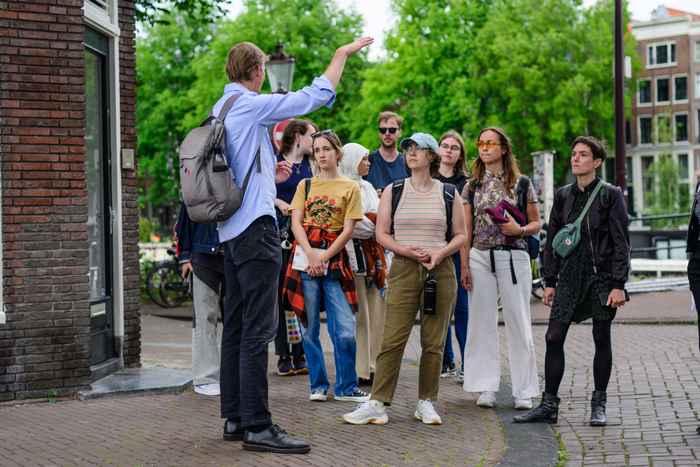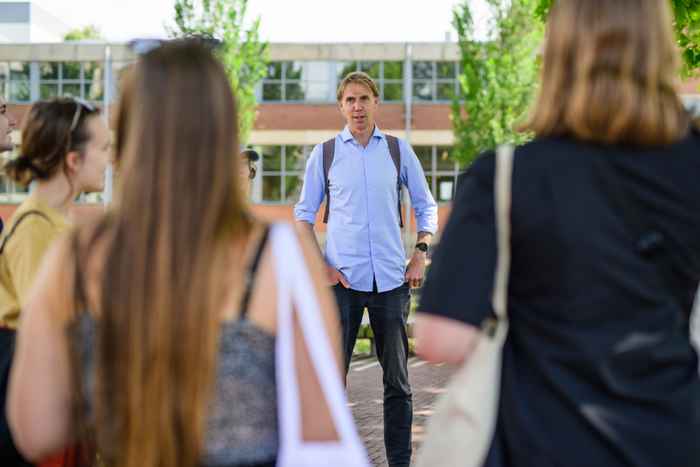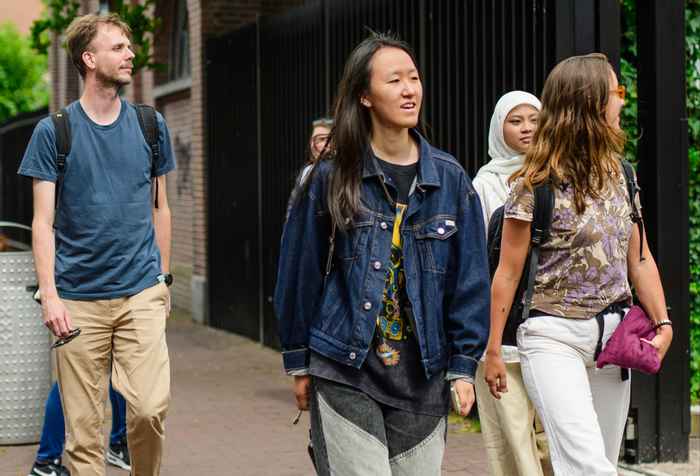The Circular City: Towards a Sustainable Urban Ecosystem
Learn about the concept of circular cities, where urban ecosystems—ranging from food and water to energy and infrastructure—are designed to regenerate natural resources and eliminate waste. Cities, though they cover just 3% of the Earth's land surface, are home to over half the global population. They drive 70% of natural resource consumption and account for up to 80% of global greenhouse gas emissions (UNEP, 2012). Urban areas are the beating heart of our material flows, including energy, water, food, and the built environment. As such, cities are key to shaping a sustainable future.
-
Programme at a glance
Mode of instruction: On-campus (3 weeks) Academic dates: Monday 20 July - Thursday 6 August 2026 Housing dates: Friday 17 July - Friday 7 August 2026 Academic fees: Student fee:
€1750. Read more about what is included in the fees.
Professional fee:
€2200. Read more about what is included in the fees.
Housing fees: €825 for a private room and shared facilities. Housing is optional. Read more about university-organised accomodation.
Credits: 6 European Credits. Read more about credits and credit transfer. Early admissions deadline: Sunday 1 February 2026
Students who require a Schengen Visa to study in the Netherlands are strongly advised to apply before the early deadline to ensure there is enough time to secure a visa appointment before the programme begins.
Regular admissions deadline: Sunday 15 March 2026 Who is this programme for? Level: Advanced Bachelor, Masters and working professionals.
Background: Students should have a strong background in social sciences, with a particular focus in in urban studies, earth sciences, sustainability and other related fields. Working professionals with experience in the above fields who wish to continue their education are also welcome to apply.
-
Programme description
The summer school takes a “holistic” approach to circular cities. Over the course of three weeks, participants learn about circular economy theory, dive into practical elements of the circular city such as energy, water, food and the built environment, social aspects such as inclusion in the circular city, behavioral change tools, learn about critiques of the circular economy, and get practical guidance into developing innovations. Key at the summer school is learning how to translate academic and practical knowledge of the circular economy to innovations for the circular city through policy and governance, business, and innovation. At the end of the summer school, participants have a broad knowledge and understanding of circular cities, as well as the skills to bridge the gap between knowledge and practice and be the innovators of today themselves.
Due to their environmental impact, cities play a crucial role in the transition towards sustainable societies. The urban environment acts as a nexus of material flows and nodes for energy, water, consumption and production. Cities are key leverage points that demand our focus if we are to accelerate the necessary transition to circular and sustainable systems, both locally and globally. We need to learn how to connect urban material, water, and energy flows, while also taking into account societal elements such as the accessibility and affordability to energy, water and housing. Furthermore, in a circular transition of cities, behavior and decision-making skills of both decision-makers and citizens are key. A circular city then, should be developed taking both technical, societal and behavioral aspects into account.
The city of Amsterdam has expressed in their 2050 strategy the ambition to become fully circular in 2050; a very ambitious goal that was broken down into smaller steps and shorter term goals in order to create a sense of urgency and feasibility. On 8 April 2020, the College of Mayor and Alderpersons approved the Amsterdam Circular 2020-2025 strategy. The strategy makes use of an adapted version of British economist Kate Raworth's "doughnut model". The model describes how societies and businesses can contribute to economic development while still respecting the limits of the planet and the community. The 2020-2025 strategy aims to halve the use of new raw materials by 2030. To reach this aim, Amsterdam will need to shake its economic system to the core; reviewing the way it produces, consumes and processes materials. The circular strategy covers a large number of measures for businesses, the city and its residents: from waste reduction to resource management, to circular construction.
While the summer school will draw on several examples from circular cities worldwide, a key focus point will be the city of Amsterdam. Students will get acquainted with the current transition of the city of Amsterdam towards a circular city, it’s best practices, and it’s challenges. Field trips and collaborative projects will focus on current and needed innovations in the city, and how to get there. Ultimately, the aim of the summer school is for students to learn from the city of Amsterdam, each other, and the best practices worldwide to bring home the theoretical and practical tools to bring circularity to their own living and professional environment.
-
Academic Directors
Daphne Truijens (PhD) is an evidence-based policy and innovation specialist. Daphne has over 10 years of experience working with academia, business and government on finding research-driven solutions for various societal issues. Her focus areas are sustainability, healthcare, and wellbeing. She holds a PhD in Philosophy and (behavioral) Economics from Erasmus University Rotterdam, and an MA in philosophy of science and LLM in legal theory from Leiden University. In addition, Daphne is the founder of the THRIVE PhD Academy helping researchers make more impact, and has held several advisory board member positions including Open Research Europe from the European Commission. Currently, Daphne is working as a sustainability consultant at TheRockGroup. TheRockGroup is a boutique sustainability consultancy with offices in Amsterdam, Brussels and Cape Town, driving the transition to a sustainable world.
Cas Smitsmans (MA) has extensive experience working as a sustainability professional in various roles such as advisor at TheRockGroup and as a teacher at the University of Amsterdam. Cas has helped set up various professional educational programs, such as summer schools & traineeships. Cas holds a BA in Business administration from Radboud University & a MA in Global Business & Sustainability from Erasmus University Rotterdam. In different roles Cas has helped organizations, and especially people within those organizations, with tools to steer towards sustainable practices.
-
Explore our community
Want to get to know more about studying in Amsterdam? Follow us on social media and join our summer community. Get a feel for our summer school vibe and our academic and social community, and learn about studying with us through the eyes of past summer school students.
Instagram | Facebook | LinkedIn | Twitter
Looking for an alumni perspective? Read this interview with Piotr Barzack, who attended The Circular City in summer 2018.



- Mode
- Short-term
- Credits
- 6 ECTS, 3 weeks
- Language of instruction
- English
- Conditions for admission
- Open
- Starts in
- July